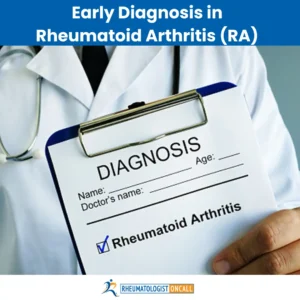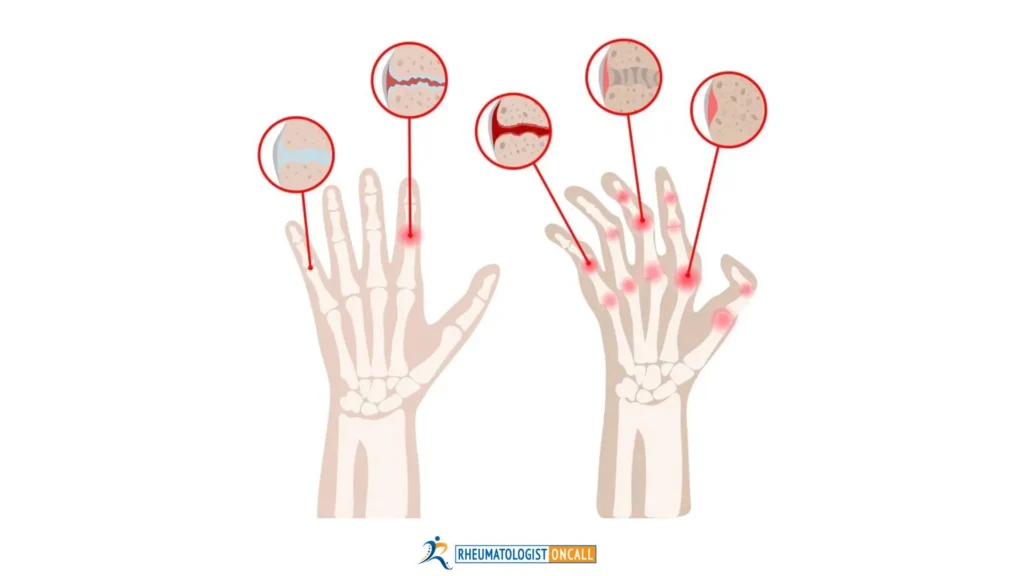SHARE
Rheumatoid Arthritis (RA) is a chronic autoimmune condition that commonly affects the small joints in the hands and feet. Not every patient develops joint pain at the beginning of the disease, which is why it is important to pay attention to the early signs and symptoms of Rheumatoid Arthritis.
Genetics plays a significant role in developing Rheumatoid Arthritis (RA). If you have an immediate family member, such as a parent or sibling, diagnosed with RA, that will triple your risk of developing the disease. It is important to know your family history as it helps in detecting early signs and symptoms of Rheumatoid Arthritis (RA).
Early Signs and Symptoms of Rheumatoid Arthritis (RA)
Low-Grade Fevers
One of the first indicators of inflammation and Rheumatoid Arthritis (RA) is a persistent low-grade fever, especially in the evening, along with flu-like symptoms. Fever can come before the joints start to hurt and be swollen.
Extreme Fatigue
Feeling excessively tired or fatigued is a frequent symptom of Rheumatoid Arthritis (RA). Fatigue is persistent despite sleeping at night, and it may become debilitating, affecting daily activities, mood, and job responsibilities.
Carpal Tunnel Syndrome
If you start experiencing numbness, tingling sensation, or weakness in both hands, this might be a sign of Carpal Tunnel Syndrome and is considered an early sign of Rheumatoid Arthritis (RA). It can cause difficulties with typing or using the hands. This is a sign of the median nerve being compressed in the wrist area due to inflammation.
Dryness in Eyes or Mouth
Dry eyes and dry mouth can also be early signs of Rheumatoid Arthritis (RA). This is also called secondary Sjogren’s Syndrome, which can be caused by inflammation in the lacrimal and salivary glands. In time, if Rheumatoid Arthritis (RA) is not well controlled it will cause visual changes, gum disease and teeth issues.
Rashes
Pinpoint rashes on the lower extremities can also be seen as early signs of Rheumatoid Arthritis (RA). They do not hurt, itch, or bleed, but they may suggest inflammation in the vessels under the skin.
Gradual Joint Pain
Joint pain in the hands and feet, which will come and go for a few days, then become more frequent and more persistent, are early symptoms of Rheumatoid Arthritis (RA). Patients will have difficulties using their hands, especially in the morning, but over the course of the day, they will not have any problems.
Early Diagnosis in Rheumatoid Arthritis (RA)

It is very important to have a timely and correct diagnosis as early as possible. If you have a genetic predisposition and start developing signs and symptoms like joint pain, low-grade fever, bilateral carpal tunnel, dry mouth, and eyes, request a consultation with a rheumatologist.
Early diagnosis means access to appropriate treatment and interventions, which can greatly influence disease progression. The goal of the treatment will be
- To prevent any joint damage
- To alleviate the pain and swelling
- To improve the quality of life
- To prevent complications like heart, lung or eye disease
Conclusion
Taking proactive measures and advocating for yourself is essential in the current healthcare environment. This is especially true if you have a family history of Rheumatoid Arthritis (RA) and start experiencing early signs like joint pain, which should not be ignored.
To address your concerns, it is important to make an appointment with a specialist who specializes in Rheumatoid Arthritis. At Rheumatologist OnCall, we are dedicated to diagnosing and treating Rheumatoid Arthritis (RA) using today’s most advanced methods.
Our comprehensive approach includes genetic assessments, state-of-the-art blood tests, and tailored treatments designed specifically for Rheumatoid Arthritis (RA).
Furthermore, our emphasis lies in adopting a holistic treatment approach that encompasses nutrition, physical therapy, and mindfulness practices. We strive to use the least aggressive medications possible while achieving maximum relief and sustainable improvements in overall health. With our multidimensional treatment paradigm, every aspect of the patient’s well-being is considered and addressed.
If you would like to schedule a consultation and embark on a journey towards better health, please visit our website or contact our office directly.














